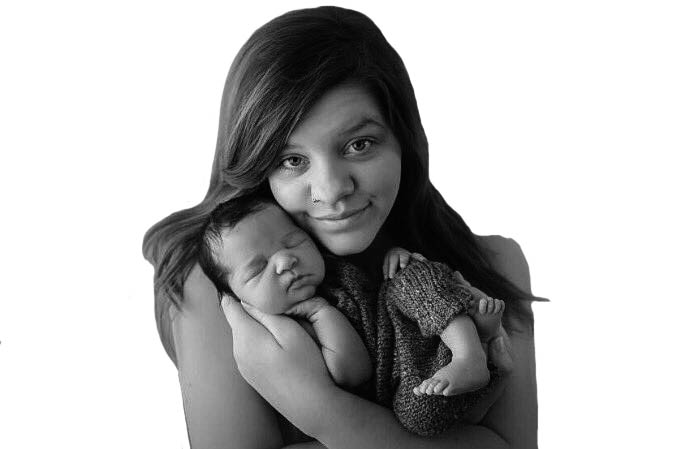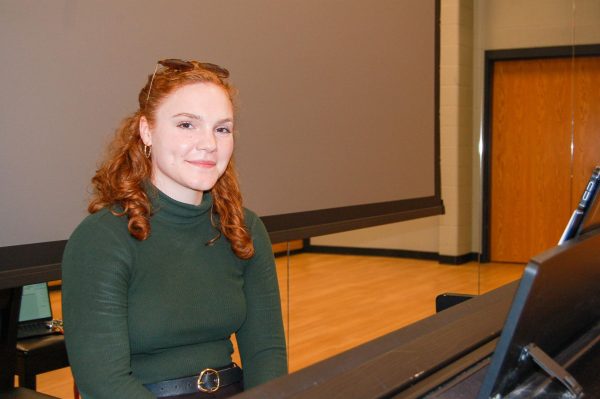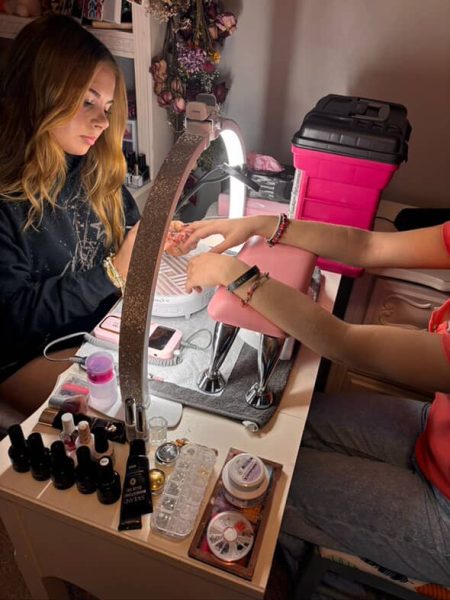Teen pregnancy at Noblesville
Teen mothers open up about their experiences
Photo by provided by Kaylee Dugger
Kaylee Dugger holding her son Lincoln. Lincoln was born this December.
A Walmart bathroom. The stalls etched with penciled-in graffiti only illuminated by hard florescent lights. Gazing down at the test that will change the course of your life.
Flash forward a few weeks, maybe months. The glares. The laughs. Eyes that follow no matter what class you’re in. Words that can be heard miles away as they are blared angrily from the loudspeaker that is the internet.
Teen pregnancy happens. It happens around the country. It happens at NHS. But what does the school do to help teen mothers?
External resources are present around Hamilton County, but as agencies like Planned Parenthood are fighting to remain government funded, many women are unsure about where they can go for help.
Kaylee Dugger graduated from NHS this past December. She recently had Lincoln, a little bundle of fat with a splash of black hair on top, who somehow slept calmly through the noisy Starbucks as his mom talked.
After Dugger found she was pregnant, she went to see the nurse’s office to see what she could do.
“I had to talk to the school, and they were really judgemental about it,” Dugger said. “I went to the nurse’s office and the nurse made me tell Mrs. Cummins. She wanted me to go to an alternative high school. And I was like no, I’m staying at Noblesville no matter what happens.”
Deana Cummins, the At-Risk Coordinator at NHS, also talked with Kristin White, a teen mom who graduated in the class of 2016, and helped her find a support group.
“This lady named Shelly would meet up with [the group] and talk to us about stuff and her pregnancy, and after I had Teegan she even reached out,” White said.
Janna Turner teaches the Child Development classes at NHS, and while they cover a unit about pregnancy Dugger and White said they found the class did little to prepare them for having their babies.
“I knew nothing and I had taken the first and second [Child Development] classes,” Dugger said. “I think they could have gone a lot more in depth.”
However, Turner said they try to connect students with resources that may be helpful.
“[A representative from Women, Infants, and Children] comes to Noblesville and does a presentation to all the Child Development classes and passes out flyers to anyone who takes care of a child,” Turner said. “It’s just raising awareness.”
The aid the school offered both girls was reactionary after they became pregnant, but according to Turner, Noblesville Schools needs to focus more on preventing teen pregnancy from occurring.
“Our Hamilton County Health Department came in and said, ‘You need to talk more about contraceptives, but we understand you can’t,’” Turner said. “And maybe we’re being a little naive, but some teens are sexually active and may not be aware of resources to keep themselves safe. The prevention of spread of sexually transmitted infection, but also prevention of teen pregnancy.”
Indiana mandates that schools execute abstinence-only sex education, meaning that some important information about birth control and contraceptives are left out in the classroom. Dugger agreed with Turner that the current curriculum needs to be improved and may present misinformation. Ignoring the fact that some high schoolers are having sex and electing against talking about safe-sex precautions leads students to form misconceptions about sex, a phenomenon Dugger noticed herself.
“[NHS should be] teaching kids that you can use a condom and still get pregnant,” Dugger said. “You can be on birth control and still get pregnant.”
The ignorance about sex and birth control can lead to ridicule against teen moms.
“I know so many people say bad things about me, and then they end up being pregnant and they thought it would never happen to them,” Dugger said.
White agreed with Dugger, saying she’d had similar experiences.
“[To] people having sex: don’t even say something about [teen pregnancies]. If you are having sex, you are at a risk of getting pregnant,” White said.
Unexpected pregnancy can be scary, and both White and Dugger voiced their initial hesitations about having their children; however, Turner was adamant about resources available to mothers.
“You’re not alone,” Turner said. “You will have a support system. There are resources in our communities specifically to help the financial burden [and] the emotional burden of teen pregnancy…I think taking early prenatal care is going to help set that child up with the best future.”

Abbie Klinker is a senior at NHS. When not writing she enjoys running in the extreme Indiana weather on the cross country and track teams, drawing, and...








